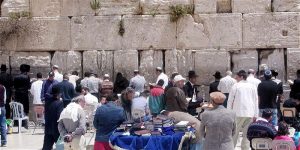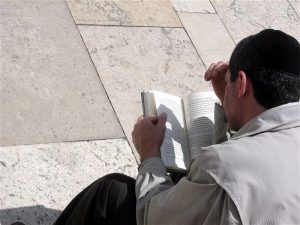From time to time I go to the Western Wall – or in Hebrew the Kotel – to pray. Standing before these ancient stones fills me with humility: Who am I in the big picture of history?
About the pyramids in Egypt it is said, “Everything  fears time, but time itself fears the pyramids.” I have the same awe-filled feeling standing next to the old stones of the Western Wall. They can tell of more than 2,000 years of history in Jerusalem. These big Herodian stones are the last fragment representing the holy temple in Jerusalem.
fears time, but time itself fears the pyramids.” I have the same awe-filled feeling standing next to the old stones of the Western Wall. They can tell of more than 2,000 years of history in Jerusalem. These big Herodian stones are the last fragment representing the holy temple in Jerusalem.
Pilgrims and tourists have, over the years, come to this place for prayer, and many have written prayer requests and placed them in the cracks in the wall. Twice a year, at the New Year and at Passover, these notes are removed to make room for new ones.
Some 20 meters below current ground level is the original surface from 2,000 years ago, from the time of Jesus. Jesus once said: “If these were silent, the stones would shout out” (Luke 19:40).
A Foreigner’s Prayer
When the first temple was dedicated by King Solomon about 3,000 years ago, Solomon uttered a beautiful prayer which is found in 1 Kings 8. Solomon prays not only for his own people who would pray in that first temple in Jerusalem, but also for the Gentiles and the foreigners: “When a foreigner comes and prays towards this house, then hear in heaven your
dwelling place, and do according to all that the foreigner calls to you, so that all the people of the earth may know your name and  fear you, as do your people Israel, and so that they may know that your name has been invoked on this house that I have built” (1 Kings 8:42-43).
fear you, as do your people Israel, and so that they may know that your name has been invoked on this house that I have built” (1 Kings 8:42-43).
I once met a person who told me a very special story. For many years he and his wife had been praying for a child, but in vain. Once on a trip to Israel, he went to the Western Wall and cried out to God this prayer of Solomon. Not long after his return home, his wife got pregnant, and they had a beautiful baby girl.
This story reminds me of the biblical story of Hannah, the mother of Samuel. In 1 Samuel 1, Hannah says, “I have been pouring out my soul before the Lord”; she was praying for a child at the temple in Shiloh. Eli, the priest at the temple, said to her, “Go in peace, and may the God of Israel grant what you have asked of him.”
I do not think that the place of prayer really matters, as God has not bound himself to a certain place. The importance lies first of all in the honest utterings of the heart or soul of the one who prays. In John 4, Jesus answers the Samaritan woman who asked him if Jerusalem or Mount Gerizim is the right place to pray. Jesus says, “But the hour is coming, and is now here, when the true worshipers will worship the Father in spirit and truth,” and, “you will worship the Father neither on this mountain nor in Jerusalem.”
New Year 5775
I admit that standing before these old stones of the Western Wall as the Jewish year 5775 is about to begin fills me with a special feeling: How many prayers have these old stones heard; how many hearts have poured out their cry; and how many have given praise to God for his answers and his mercy? Only God knows. But I feel confident entering this new year because I know that God goes with us into it, and I know that he is the one who hears our prayers, both here in Jerusalem and to the ends of the earth.
Elisabeth E. Levy